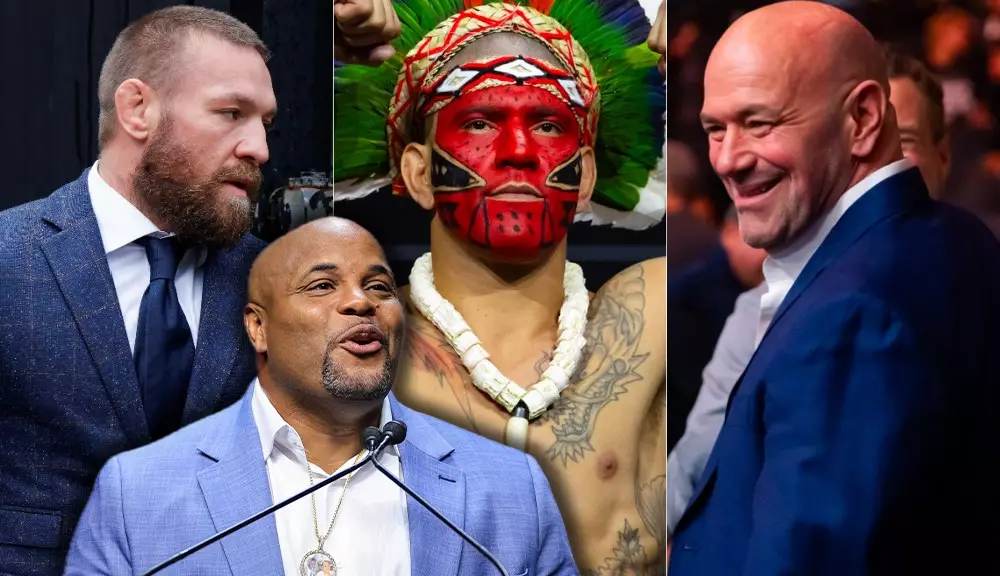Mixed Martial Arts (MMA) has experienced dramatic growth and transformation over the past year. With several high-profile athletes and executives making headlines through their actions, Daniel Cormier—UFC Hall of Famer, commentator, and former two-division champion—has identified critical figures who have notably impacted the sport in 2024. This article delves into Cormier’s perspectives on these influencers and the unique contributions they have made, reshaping the dynamics of MMA.
A standout figure in Cormier’s rankings is Hunter Campbell, the UFC’s chief negotiator. Cormier noted that Campbell’s ability to foster relationships with fighters and their management has revolutionized fight negotiations. His talent for facilitating fights that seemed unlikely moments ago has not gone unnoticed. Cormier recalls his own experience working with Campbell, emphasizing the simplicity and efficiency of their interactions compared to the often arduous processes many fighters endure. Campbell’s accessibility and willingness to engage with fighters has made him a trusted figure in the realm of negotiations.
Indeed, Campbell’s contributions go beyond mere transactional negotiations; he has become a pivotal bridge between the fighters and UFC’s upper management. As the UFC strives for growth and broader appeal, Campbell’s approach helps ensure that fighters feel valued and understood, which is crucial in maintaining talent within the organization.
Despite not stepping into the octagon in a while, Conor McGregor remains an enigmatic presence in MMA. His influence transcends the sport itself, as showcased by the recent buzz surrounding his press conferences—even in the midst of injury-related uncertainties. As Cormier articulated, no one else generates such anticipation and media frenzy merely through the prospect of a return. The way McGregor captures the headlines, whether due to his fights or personal controversies, illustrates his magnetic hold over MMA fans and the sports world alike.
Ultimately, McGregor’s capacity to draw attention not only reaffirms his status as one of the greatest athletes in MMA but highlights how he continues to shape the narrative around the sport. His presence may have transformed traditional marketing strategies, redefining what it means to be a superstar in combat sports.
Jon Jones remains one of the most polarizing yet undeniably brilliant talents in MMA. Cormier emphasized Jones’s longevity in the sport and his continued ability to headline major events, like UFC 309, reinforcing his status as an elite fighter spanning multiple generations. Cormier notes that beating legends such as Stipe Miocic adds more depth to Jones’s legacy.
However, perhaps equally significant is Jones’s ability to control the narrative surrounding his career. He continuously manages expectations regarding his fights—initially declining to face Tom Aspinall, he remains a cornerstone of discussion within MMA, whether actively competing or not. His capacity to navigate controversies and controversies with poise demonstrates a mastery of self-branding within the unpredictable realm of MMA.
Alex Pereira’s ascent in the sport has been nothing short of meteoric. Cormier highlights Pereira’s pivotal role in several critical fights and events in 2024. From saving UFC 300 to showcasing his striking prowess in high-stakes matchups, Pereira’s performances have solidified him as a formidable competitor. His ability to adapt and excel in the octagon not only contributes to his success but also leaves a significant impact on the way fans perceive fighters in contemporary MMA.
Moreover, Pereira’s willingness to engage in exciting bouts—often resulting in breathtaking finishes—has enriched the broader MMA narrative. He exemplifies a modern fighter dedicated to artistry and strategy, pushing boundaries while captivating audiences, vital for maintaining interest in the sport.
No exploration of influential figures in MMA would be complete without mentioning Dana White. Cormier underscores White’s continual drive to expand the UFC’s influence, asserting that much of the promotion’s success can be traced back to his vision. Whether negotiating television rights deals or exploring international markets like Saudi Arabia, White has consistently pushed the organization forward.
His sometimes controversial yet bold approach has defined much of what we know as modern MMA. While some may view him as a polarizing figure, Cormier’s acknowledgment of White’s relentless efforts emphasizes the importance of strong leadership in building a sports empire.
As 2024 draws to a close, the contributions of figures like Hunter Campbell, Conor McGregor, Jon Jones, Alex Pereira, and Dana White continue to resonate within the MMA landscape. Daniel Cormier’s insights shed light on how their distinct roles intertwine to shape the sport’s evolution. The MMA community eagerly awaits how these influential players will further develop the sport and continue to engage an ever-growing global audience. Understanding these dynamics is vital as fans and analysts alike strive to comprehend the intricate tapestry of MMA today and beyond.

